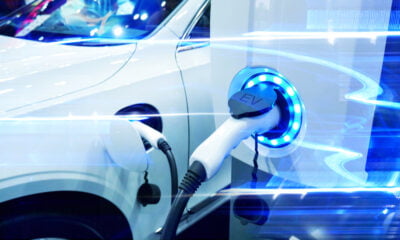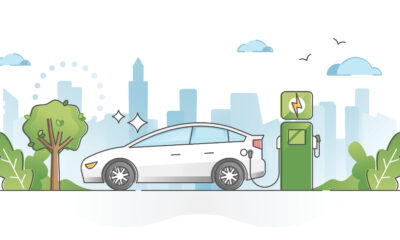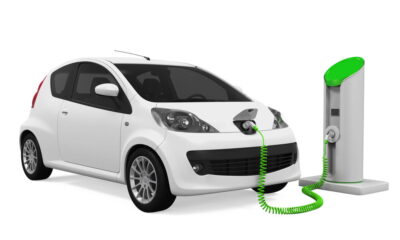Features
The Car of Tomorrow
Nick Slawicz investigates tomorrow’s cars before taking a close up look at today’s electric vehicles.
In 2006, Chris Paine’s documentary Who Killed the Electric Car? was released to lukewarm (but still generally favourable) critical consensus. A common complaint, however, centres on its polemical view that the auto industry’s future lies in the battery electric car (BEV), implying a lack of alternatives as serious contenders for the title of Car of Tomorrow.
But this is not the case, and research is ongoing into dozens of fuel sources, ranging from the well known (liquid petroleum gas, hydrogen, biofuels made from renewable plant material) to the less publicised (liquid nitrogen, compressed air). There are also the outright ridiculous: despite its breaking two out of the three laws of thermodynamics, claims of a car fuelled entirely by water have been running wild since at least 1935. Though several websites offer engineering schematics and testimonials as to its success, there is no proof that it works under laboratory conditions.
Assuming for a moment that Big Oil is not attempting to smother the threat of water-fuelled vehicles, it seems likely that whichever fuel source powers the car of the future is going to have some serious drawbacks. Fossil fuels release harmful gases into the atmosphere. Biofuels generally have a lower efficiency than fossil fuels, and may produce harmful by-products at the point of production. Hydrogen fuel cells emit water only at the user’s end, and still require a lot of energy – and thus harmful waste – to manufacture; they are also subject to “leaching”’, which is when (like a helium balloon) the fuel seeps through the container itself and is lost without being used. BEVs work well, but currently have a limited range and are significantly more expensive than internal combustion engines.
It seems as though a compromise is needed for now. And, with the infrastructure already in place for gasoline-powered vehicles, an economic downturn and a waiting period of years before a single suitable alternative could be implemented (let alone supported for multiple vehicular energy sources), that compromise may well be the hybrid electric, which has already been snapped up by millions of people around the globe. Sales of the Toyota Prius alone reached 38,600 in the UK between 1997 and 2010, and show no signs of slowing down. Yet, improvements to all alternative fuel sources will come about with funding and effort from industry. When the clear successor to petrol power emerges, as it must, billions of pounds will be up for grabs – and the environmental benefits will be felt by all future generations.
The electric car might be a promising option in the future of alternative fuel vehicles, but it is not without its flaws. In the recently-released RAC Report on Motoring for 2010 32 percent of respondents stated they would “definitely consider buying an environmentally friendly car”, with an additional 56 percent claiming they “might” consider this as an option. However, fewer than half of those polled stated that an electric car would be a consideration.
And why is this the case? Worries about the practicality of electric cars are many and varied, including the top speed and the distance they can be driven between charges, both of which, in the past, have been limiting factors in the development of battery electric vehicles (BEVs).
Thankfully, we’re now past the stage of the concept car, and new production cars are emerging that are designed to fix the perceived problems and test the boundaries of what BEVs can do. The most famous of these is probably the Tesla Roadster – developed two years ago in America and currently available for approximately £87,000. It offers an impressive range and speed: a travelling distance of 245 miles per charge and 0–60 mph in 3.7 seconds.
More recent developments in BEV technology have resulted in the production of the Nissan Leaf, the latest darling of the environmental movement. Although its top speed and average miles per charge are low compared to the Tesla Roadster (0–60 mph in 7 seconds and between 73 and 100 miles per charge, depending on which source you go to), so is the price tag: at £23,990 (including the new 20 percent VAT rate), the Leaf is proof that affordable electric cars are a practical solution, even if they are not yet as widespread as they could be. In fact, the car industry seems so confident its future lies in this direction it has already awarded the Nissan Leaf 2011 European Car of the Year.
As the question of BEV technology’s future success is still up in the air, we environmentally concerned can remain confident that it is being given every opportunity to flourish in the automobile marketplace.


 Environment12 months ago
Environment12 months agoAre Polymer Banknotes: an Eco-Friendly Trend or a Groundswell?

 Features11 months ago
Features11 months agoEco-Friendly Cryptocurrencies: Sustainable Investment Choices

 Features12 months ago
Features12 months agoEco-Friendly Crypto Traders Must Find the Right Exchange

 Energy11 months ago
Energy11 months agoThe Growing Role of Solar Panels in Ireland’s Energy Future




























